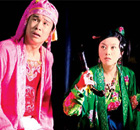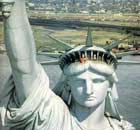Zhu Yuan
The way anti-corruption fiction is written
By Zhu Yuan (China Daily)
Updated: 2009-12-16 07:19
 |
Large Medium Small |
Anti-corruption fiction (fantan xiaoshuo in Chinese) is a popular catchphrase now. But there was no such expression in the early 1980s and it was impossible for such fiction to be published at the time. There could be episodes about a fight against corruption in a particular novel, but it would have been politically problematic for an entire piece of fictional work to be focused on the topic.
But it became a genre in Chinese literature about a decade ago when the fight against graft turned out to be an issue that the central authorities could not afford to ignore. This fact itself points to the dramatic change that has taken place in the country's politics.
On the one hand, the big cases involving senior government officials and the rising number of cases have become a reality to which the central authorities could no longer turn a blind eye. Communist Party authorities reiterate time and again that the fight against corruption is of significance to the fate of the Party and the government.
On the other hand, readers are interested in such fiction and they sell well in the market. The promising market has propelled more novelists and publishers.
The distinction is striking between the works in the 1990s and their current counterparts. The early ones were based on big cases which were cracked and the story line focused on how the corrupt officials embezzled public money or took bribes by abusing their power. They were more like detective stories.
Among other things, they were very balanced when it came to the portraying of corrupt officials and their upright counterparts. It was always the vice-directors, vice-mayors or someone in similar positions who were corrupt. In contrast, top leaders were depicted as upright.
The message behind this formula was that justice would finally prevail despite the rampant corruption within the government and Party. There were always those in top positions who placed the interest of the Party and of the people before everything. Because of their resolve against corruption, there was always hope that the battle against corruption would finally succeed.
Such stereotypes were obviously out of political considerations. A novelist could not draw a pitch-dark picture of officialdom, which would make readers lose heart. And heroes would be, of course, top leaders who represented the right leadership of the Party and government.
With more and more senior government officials nabbed as corrupt elements and furthering of the fight against abuse of power in recent years, novelists are not satisfied with the old stereotype, and they try to delve deep into the inner world of not just corrupt officials but all officialdom.
By depicting how some officials climb up the ladder of hierarchy by currying favor with their immediate authorities or playing safe by doing everything tactfully, novels such as The Color of Blue and Yellow and Memoirs of Civil Servants point to the bad ecology of officialdom that makes it hard for an upright and honest official to have his or her way.
Rather than just portraying how greedy or dictatorial a particular corrupt element is, as their counterparts did in the early 1990s, they try to describe the depraved and decadent side of officialdom from the angle of human nature and a flawed system.
By doing so, they send a message that the fight against corruption is much more complicated than we can possibly imagine. And apart from punishing as many corrupt elements as possible, it is even more important to improve the ecology of officialdom and build a system that can effectively supervise the use of power.
Compared with their old counterparts who made readers happy and excited with all corrupt elements arrested and punished in the end, they tend to make readers think with their insight into the whirlpool of officialdom and subtle exposition of the defects in system.
If we get from the former a conviction of a promising future, we are given a warning from the latter that something must be done to thoroughly cleanse officialdom and the system, and foot-dragging will be disastrous.
The trajectory from the birth of this literature genre to the change in the way it is written now reflects how far this country has traveled in the direction of becoming a pluralistic society.
E-mail: zhuyuan@chinadaily.com.cn









